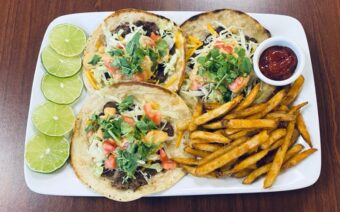
November 18, 2024
GREEN BAY – When Amy Lee opened the first sushi bar and restaurant in the Green Bay area, 22 years ago, she said she wasn’t sure what to expect.
More than two decades later, Lee said she remains grateful for not only those customers who have stuck by her all these years and made Little Tokyo Japanese Cuisine & Sushi Bar (121 N. Broadway) a success but the new ones she’s gained along the way.
It’s that gratitude and care for others that prompted the long-time restaurant owner to expand the restaurant’s menu with the recent addition of Thai cuisine.
Lee said the mother of someone she knew – a Thai chef who had previously worked in Washington state and Michigan – was looking to semi-retire in Wisconsin.
Wanting to help, Lee said she told her friend that if her mom wanted to come here, she would create a small Thai menu for her to do.
Luna Osathanont made the move, Lee said, and together the pair added Thai entrees to Little Tokyo’s regular menu – including cashew chicken, cashew salmon, sweet and sour chicken or spicy chicken basil.
Other entrees, Lee said, include:
- Drunken Noodle, which is a pan-fried rice noodle with egg, broccoli, carrots, bell pepper, green onion, mushroom and fresh basil. Chicken, beef, shrimp or tofu can be added.
- Pad See Ew is a slight variation of the Drunken Noodle, with a pan-fried rice noodle, egg, broccoli and carrots in a sweet and savory black sauce. Chicken, beef, shrimp, or tofu can also be added.
- Pad Thai, a rice noodle stir-fried with egg, green onion and bean sprouts in a tangy sauce, topped with peanut and lime.
Lee said Osathanont also prepares a variety of Thai appetizers and salads.
“As far as experience goes, I would say she’s top-notch,” she said. “We don’t advertise it – our regular customers just know we now have Thai food. It’s been a big hit, and we’ve been selling a lot of it. We have repeat customers who are coming here all the time for the Thai food. It’s mostly all by word of mouth. But most of our business has always been word of mouth.”
Support of customers pays off
Lee, who was born in Laos, said she moved to South Carolina with her family when she was a child.
After attending the University of South Carolina, where she studied nursing and earned a degree in psychology, she said she met and married a man from Green Bay.
Once settled in Northeast Wisconsin, Lee said she pursued the last year of her nursing degree, but ultimately decided to use her psychology degree to get a job as a social worker.
Though succeeding in her chosen field, Lee said coming from a family of business owners, she always had the idea in the back of her mind to have a business of her own.
An opportunity came along where she went to work for a Japanese sushi company selling sushi inside Pick ‘n Save in Appleton.
“The company was based in California, and a friend of mine opened up a little sushi bar through them in a Madison-based grocery store. That’s how I heard about it,” Lee said. “It was through that job that I learned about sushi and established my original customer base. I later moved it to Festival Foods in Green Bay, both east and west.”
Through the urging of many regular customers and their promises to stick with her, Lee eventually opened Little Tokyo.
At the time, she said the building the restaurant is in was available, so she and her husband bought it.
Lee said Little Tokyo was in one part of the building, with Lee’s Grocery Store in the other half, which her mother-in-law owned and operated.
“But as time passed, she got a little older, and we needed more space, so we (suggested she retire) and just enjoy life,” she said. “She’d been working her whole life, and it was important to relax and enjoy life. She decided that made sense, so we got rid of the grocery store and opened it up for the restaurant.”
Today, the building can easily accommodate 80 people, and if needed, up to 110.
Education important part of success
Though Japanese cuisine was known by many in the region, Lee said sushi wasn’t – in fact, “we had no idea what to expect when we first opened.”
“It was, after all, Green Bay, Wisconsin, and we were the first sushi restaurant here,” she said. “But we learned something about people here, and that is that once they believe in you, they will stick with you. Many of my customers have stuck with me from the beginning, like those early days in the grocery stores. I’m very thankful for that. I knew it would be challenging when I started, but I was determined to make it work. Education is the biggest thing – explaining to people what sushi is all about.”
Though the first thing many people think when they hear “sushi” is raw fish, Lee said that is not all sushi is.
With sushi, which vocabulary.com defines as a Japanese word meaning “sour rice” – Lee said, it’s the rice that’s at the heart of sushi.

“You can do whatever you want with sushi,” she said. “It can be cooked, it can be raw, you can do tempura, anything you want.”
When someone comes in for the first time, Lee said she’ll ask if they want to try sushi and they immediately say “no.”
But if she asks them if they want to try California Roll, they almost always say “oh, sure.”
“It’s just the word that confuses people because they don’t know what sushi really is,” she said. “Sushi can be customized. You can add on, you can take something out. You can also tempura the whole roll. I’ve learned that a lot of people here like us to tempura the whole roll.”
For example, Little Tokyo has an item named JB Maki, which is like a Japanese bagel.
“I roll it up with salmon, avocados, scallion and cream cheese and tempura the whole roll, then cut it up,” Lee said. “The entire roll is battered and deep-fried. And it’s good for you, too, because salmon is very good for you. It’s very healthy.”
The Sumo roll, Lee said, is a cooked roll that is popular among customers.
“It is a tempura scallop and tempura shrimp, jalapeño, cream cheese, with a little cucumber inside,” she said. “It is topped with a spicy mayo and eel sauce. The Fantasy is also very popular if you like things raw. It’s a combination of fish – tuna and salmon, imitation crab – and avocado inside, then you’ve got the sesame seed, spicy mayo and eel sauce on top.”
Little Tokyo’s Dynamite sushi dish, she said, is also a customer favorite.
It is a California roll topped with the house special – baked spicy baby shrimp sauce.
Lee said other popular menu items at Little Tokyo include teriyaki sesame chicken and its signature dish, Amy’s Special, which is a completely cooked soft-shell crab, served with some imitation crab, lettuce and cucumber, with a little teriyaki base on top.
Changes through the years
With the exception of the recent addition of Thai food, Lee said Little Tokyo’s menu has remained pretty much the same since day one.
Over the years, restaurant hours, she said, have changed somewhat over the years – now open from 4:30-9 p.m. Monday through Saturday.
Though Little Tokyo used to be open for lunch, since the COVID-19 pandemic and not being able to find the help needed to offer lunch-hour dining, Lee said they no longer serve lunch, and it’s doubtful they will ever go back to that.
However, Lee said she does offer catering and private group services – doing what she can to make each event unique.
“I may do a private lunch for a group if they call me in advance and tell me they’ve got a larger group, like 30 or 40 people,” she said. “I try to find out what the people like and then customize something for them. Not everyone likes sushi, some people are vegetarians, some only want seafood, some only want beef, some want strictly raw. We try to create a menu where everyone can find something to eat.”
Since COVID, Lee said she has found some products are hard to come by.
With dry products, ordering in larger quantities works, however, that isn’t possible with meat and vegetables – which, she said, means she makes a trip to the grocery store every day.
“Since COVID, I have to shop quite a bit on a daily basis to get fresh veggies,” she said. “I want to make sure I can hand-pick my products so I know they’re fresh. It’s become challenging to get some products (from suppliers) in other countries. They come from China, Thailand and Europe. A lot of it I cannot get, and when you can get some things the price is outrageous. So, I just decided to go shopping every day to get what I need.”
However, despite the challenges of running a restaurant, especially these days, Lee said she wouldn’t trade it for anything in the world.
“I love cooking and serving people, and I take great pride in the food we serve. If they enjoy the food, I’m happy,” she said. “If our food is not good, I don’t want a dime of their money. It’s not fair to charge them if the product isn’t good.”
Lee said if customers don’t like something they ordered – “I want to find out why, so we can improve ourselves.”
“I don’t want people to be afraid of sushi,” she said. “I encourage them to give it a try.”
Lee said in March 2025, she plans to do something she hasn’t done in 22 years – shutting down the restaurant to “take a longer vacation.”
“I need to get away and get rejuvenated,” she said. “Life is too short – you have to enjoy it a little bit when you can.”
Lee said she and Osathanont will both be going back to their native countries to visit family.
“We’re going to start taking some time now to do the things that are important to us,” she said.
For more on Little Tokyo Japanese Cuisine & Sushi Bar, visit greenbaysushi.com.
 Oshkosh Celebration of Lights + EAA = Win-win partnership
Oshkosh Celebration of Lights + EAA = Win-win partnership ENT & Allergy Associates opening new clinic in Stevens Point
ENT & Allergy Associates opening new clinic in Stevens Point








